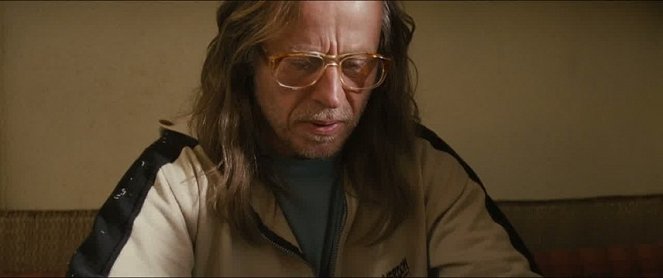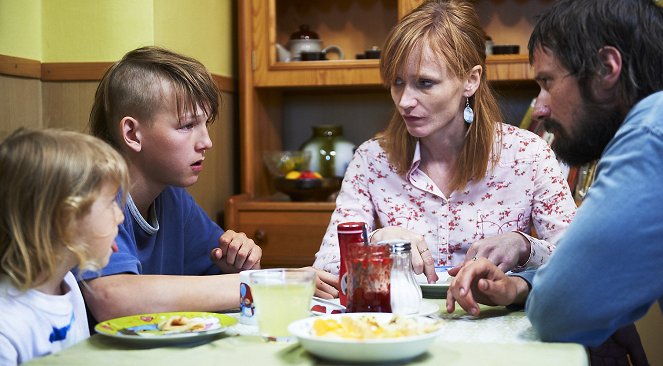Réalisation:
Bohdan SlámaScénario:
Bohdan SlámaPhotographie:
Diviš MarekMusique:
Vypsaná fiXaActeurs·trices:
Jaroslav Plesl, Aňa Geislerová, Marek Šácha, Anička Bubeníková, Karel Roden, Klára Melíšková, Igor Chmela, Jiří Mádl, Miroslav Sabadin (plus)Résumés(1)
Fogi is a weirdo, who’s enjoying his never ending puberty. But simultaneously, Fogi is also trying to live up to his family duties and bring up Véna, his son from the first marriage. He didn’t get married again but lives with Jana, a post office employee. Together they have little Anicka and they all live in a flat in a small town. At first, Jana is trying to tolerate Fogi’s moods, but her patience is running out. Fogi loses his job. On top of that he starts to see himself in his adolescent son and realizes with horror that Véna repeats his own mistakes. The first fights, bans and mutual misunderstandings are approaching... (texte officiel du distributeur)
(plus)Vidéo (6)
Critiques (5)
Bohdan Sláma is one of the few contemporary Czech directors who, in my opinion, has something to say to his audience. The problem is that he doesn't always choose adequate means and quite often comes up with rather lifeless constructs instead of real burning stories from life. In the case of Four Suns, after just a few minutes, I felt like Sláma was speaking a different language than the one I understood. I really didn't get this film. After 33 minutes of suffering, I gave up and, of course, in that case, I also gave up on rating it with stars. However, if I managed to endure until the end, the star allocation would truly be modest. Probably extremely modest. In one scene, Karel Roden asks the people present why they're here, and what they're doing, and I kept asking myself the whole time why I was watching it when there are thousands of more sensible ways to spend my free time...
()
Once again, Sláma was able to make me want to kill myself right at the beginning of the screening. Luckily, Aňa Geislerová came on the scene after that, and despite all the issues she was there throughout the rest of the film. That's all that happened. So why should I even waste my time analyzing this? The final piece of wisdom, i.e., "I'm going to take a piss." speaks for itself. The trio of Melíšková, Chmela, and Plodková also didn't work any miracles. In the end, perhaps I could add that a debate on the topic of the educated and uneducated viewer would be interesting, or not.
()
Bohdan Sláma certainly doesn't belong to those creators that I would actively seek out. His characters are often quite similar, but well, he simply focuses on a certain group of people and is drawn to the countryside or small town. For example, I liked "The Country Teacher," whereas "Four Suns" is a very empty statement about how some people have a pretty shitty life, but they will continue living it because they don't know any other way.
()
Unfortunately, the best thing about this movie is the title song from the band Vypsaná Fixa, which is really completely divine and fits this film and its melancholy perfectly. Other than that, I didn’t understand a lot of people in this relationship drama, Anna Geislerová the least of all. I wonder if she herself understood the behavior of her character, because if she did, she defended her acting arguments perfectly. Similarly, I didn’t quite understand the character of Karel Roden, who, as usual, plays a character named Karel and is once again a jerk. The last surprise is Jirka Mádl, who has a Mohawk on his head and is a tough punker. Too bad there’s no more to see in this film. In retrospect, I realize that there are a lot of weird people in the film who are all fucked, and that’s the end of it.
()
Characters looking for happiness is no longer surprising when it comes to Sláma, as well as a touch of tolerable social romance (poverty is definitely not a social stigma for him, neither positive nor negative - rather a productive state of being that encourages searching). In the Czech Republic, spirituality surprises - in addition to booze and barren revolt, the characters are looking for a starting point in "something that transcends us" - and Sláma managed to capture the essence of Czech "Nazism" and contemporary fixation on new age fetishes such as the return to mother earth. The spiritual pilgrimage to find the Master is a turning point, a place where the current absence of meaning becomes the meaning itself (after all, who can resist the naive idea of whether a vulgar gardener is not a mystical Master...). Four Suns shines with a moment of unfulfilled faith followed by a merciful lie. It's a strong moment, relieving and depressing at the same time. Except for minor staging shortcomings, however, all the topics examined stand out herein. Sláma has the gift of an observer, and the cliché about pot smokers turns into an authentic experience in its presentation (the dialogue at the toilets is masterfully composed, with great internal tension). The way in which the director "bent" familiar faces also deserves to be highlighted, so it feels quite natural in the roles of freaks and lost people. Criticisms? I understand the therapeutic effect of the ending, but the catharsis is more on the director's side. In addition, after excellently and intuitively accurate scenes, the "heavenly feast" sounds very awkward. And one more remark: I will be really pleased when a Czech filmmaker can do what the Turkish filmmakers are capable of, for example to expose the character to the elements without imagining the sprinklers they have over their heads. Otherwise, it’s excellent.
()



Annonces